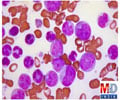Highlights:
- The anti-malarial drug dihydroartemisinin increases the sensitivity of lymphoblastic leukemia cells to the BH3-mimetic ABT-263
- The combination improves survival in mice with the cancer
- The combination could possibly improve outcomes in patients with Philadelphia-chromosome positive acute lymphoblastic leukemia
Scientists studied the effect of dihydroartemisinin an anti-malarial drug in combination with the BH3-mimetic ABT-263 on mouse and human BCR-ABLþ lymphoblastic leukemia cells, as well in a mouse model with the cancer. This type of leukemia, also called Philadelphia-chromosome positive leukemia, has poor outcomes.
The scientists found that:
- Dihydroartemisinin reduced the expression of the MCL-1 molecule, thereby increasing the sensitivity of the leukemic cells to death induced by ABT-263. It induces a protein called CHOP and triggers a cellular stress response that blocks protein synthesis. Resistance to treatment with ABT-263 was not noted in the cells treated with the combination
- The combination increased the survival duration of the mice with the cancer
It must be remembered that other normal cell types are also dependent on MCL-1 for their survival. Therefore, the treatment could have adverse consequences on the normal cells. The scientists selected dihydroartemisinin to reduce the MCL-1 expression since it is already approved for the treatment of malaria, and is therefore likely to be associated with acceptable side effects.
Further developments in this direction could result in better outcomes for ALL patients that are positive for the Philadelphia chromosome.
About Acute Lymphoblastic Leukemia
Acute lymphoblastic leukemia, also called acute lymphocytic leukemia, is a type of blood cancer that affects a type of white blood cells called lymphocytes. The immature lymphocytes multiply in an uncontrolled manner and if the patient is not treated early, the cancer can progress quickly. The cancer affects children as well as adults. The symptoms include weight loss, fever, bruising, painless lumps, bone pain and extreme fatigue.The treatment options for ALL includes chemotherapy, radiotherapy chemotherapy with stem cell therapy, or targeted therapy.
- Budhraja A et al. Modulation of Navitoclax Sensitivity by Dihydroartemisinin-Mediated MCL-1 Repression in BCR-ABL+ B-Lineage Acute Lymphoblastic Leukemia. Clin Cancer Res (2017); 23(24); 1–11.













